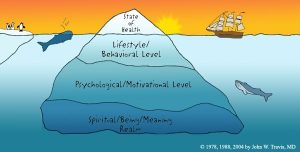
Said simply: We, the human race, actively choose and engage in behaviors that significantly contribute to chronic disease – and chronic disease, is what’s killing us prematurely.3
Have you heard the phrase “sitting is the new smoking”? How many of us, or someone we know, have expressed feeling overworked with too many important commitments, reducing our sleep and increasing our stress? Even though we know, to some degree, about the result of our health risk behaviors we are consciously choosing, for the majority of us that knowledge alone is not enough to motivate us to take effective actions to create a result of us feeling healthy and well.
Why?
The underlying mindset of the illness orientation can only get us back to neutral, if you recall. Are you familiar with the Outcome and Reactive Orientations embedded in Bob Anderson’s work within the Leadership Circle Profile? If so, you may astutely be noticing a parallel between this “illness orientation” to the predictable pattern of the Reactive Orientation. Because the attention is on what we don’t want (illness) rather than on the greater outcome of what we do want (wellness), we predictably get episodic and short-term results from our behavior change efforts. 4
Shifting to a “wellness” orientation and defining that aspirational want can result in a more achievable and sustainable outcome of “wellbeing”, no matter where along the disease state spectrum we may be. This is true for us all – not just those classified as patients.
Here enters the pivotal role of a health and wellness coach (HWC). These coaches partner with clients who want to create lasting changes by evoking their vision, values and beliefs in order to promote their health and wellness, thereby enhancing their wellbeing. 5 The fundamental approach incorporates traditional coaching competencies with basic knowledge in a variety of health and wellness subject matter topics like nutrition, diabetes, heart disease, cancer, chronic disorders, anxiety and stress.
Dr. Travis’ Iceberg model of Health and Disease nicely depicts the layers of focus that health and wellness coaches uncover with their clients. Rather than stay at the tip of the iceberg addressing just the current state of health, they partner to dive beneath any illness classifications, environmental influencers, and/or potentially limiting beliefs standing in the way of achieving their desired state of health and wellbeing. HWC focuses on empowering clients to create lifestyle changes in their behavior, especially health risk behaviors.

Download Article















Joy Goldman
January 15, 2019 at 9:36 pm
Petra, thanks for providing a powerful glimpse into the impact health and wellness coaching makes in our world. I appreciated the balance of statistics and theory, with the illustrative story– one that many of us can understand!